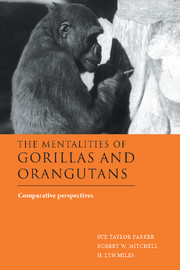Book contents
- Frontmatter
- Contents
- List of contributors
- Preface
- Acknowledgments
- I Comparative evolutionary and developmental perspectives on gorillas and orangutans
- II Cognition and tool use in gorillas and orangutans
- III Communication in gorillas and orangutans
- IV Social cognition in gorillas and orangutans
- 14 Comparative aspects of mirror self-recognition in great apes
- 15 Deception and concealment as strategic script violation in great apes and humans
- 16 Levels of imitation and cognitive mechanisms in orangutans
- 17 Parental encouragement in Gorilla in comparative perspective: implications for social cognition and the evolution of teaching
- 18 The development of social roles in the play of an infant gorilla and its relationship to sensorimotor intellectual development
- V Epilogue
- Index of authors
- Index of subjects
18 - The development of social roles in the play of an infant gorilla and its relationship to sensorimotor intellectual development
Published online by Cambridge University Press: 20 October 2009
- Frontmatter
- Contents
- List of contributors
- Preface
- Acknowledgments
- I Comparative evolutionary and developmental perspectives on gorillas and orangutans
- II Cognition and tool use in gorillas and orangutans
- III Communication in gorillas and orangutans
- IV Social cognition in gorillas and orangutans
- 14 Comparative aspects of mirror self-recognition in great apes
- 15 Deception and concealment as strategic script violation in great apes and humans
- 16 Levels of imitation and cognitive mechanisms in orangutans
- 17 Parental encouragement in Gorilla in comparative perspective: implications for social cognition and the evolution of teaching
- 18 The development of social roles in the play of an infant gorilla and its relationship to sensorimotor intellectual development
- V Epilogue
- Index of authors
- Index of subjects
Summary
THE STUDY
This chapter reports on the development of social play during the first three years of life of an infant lowland gorilla living in a social group at the San Francisco Zoo (Parker, 1977a). It presents a hierarchical model for describing the temporal structure of play and its development in a single subject: at the highest level are the longest units, episodes of play. These are composed of shorter units, bouts of play. Bouts, in turn, are composed of games. Games are composed of the shortest, lowest-level units, schemes. Play bouts and episodes are punctuated by play regulators including enticements, terminations, and interventions. It also focuses on the relationship between social play and cognitive development.
Subjects
The subject of this study is an infant lowland gorilla (Gorilla gorilla gorilla) born and reared in a social group at the San Francisco Zoo: Mkumbwa was born May 1, 1975 to a wild-born mother, Jacqueline, and a wild-born father, Bwana. He is the younger brother of Koko, a gorilla who was taught to sign by Francine Patterson. At the time of the study, the social group was also composed of Mrs, a wild-born female, her male infant, Sunshine, also fathered by Bwana, and a nulliparous captive-born female, Pogo (referred to as Mkumbwa's “aunt”). Mkumbwa is currently the silverback male of the group which still includes Bwana, now a grandfather, and Pogo, as well as two younger females, Zura and Bawang. The group also includes Bawang's infant sons, Shango and Barney, fathered by Mkumbwa.
- Type
- Chapter
- Information
- The Mentalities of Gorillas and OrangutansComparative Perspectives, pp. 367 - 394Publisher: Cambridge University PressPrint publication year: 1999
- 1
- Cited by



